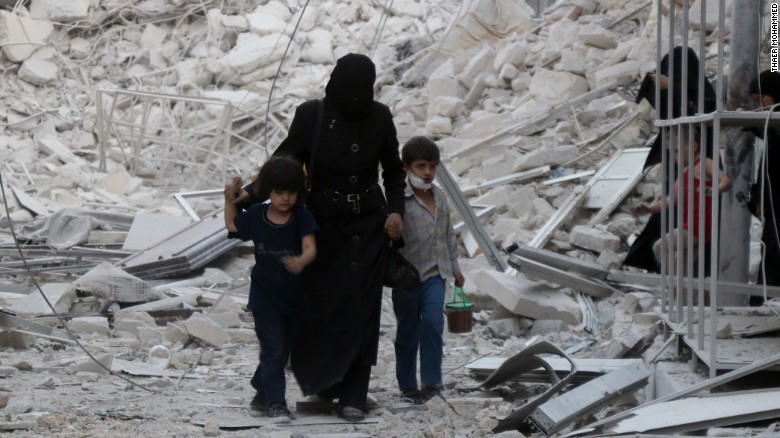Washington – As an estimated 10,000 Syrian-led ground troops amass east of Aleppo, the US is considering a tougher response to Russia over its support for the Assad regime and its role in the bombardment of the city, senior administration officials told CNN.
The troops have gathered in advance of what is believed to perhaps be a final ground assault over the coming days by Syrian government forces against rebels holding the key city, in what one US official described as an unprecedented degree of firepower to be unleashed on the besieged area.
While no decisions have been made about moving against Russia, American consideration of more aggressive actions comes amid a threat by Secretary of State John Kerry Thursday to halt diplomacy with Moscow over Syria.

Diplomatic difficulties
With diplomacy failing, US officials say initial brainstorming sessions are taking place throughout the government at the staff level on alternatives to working with Russia, ranging from economic to military measures.
They stress no recommendations have been presented to the White House. One official said the US is looking back to the “Ukraine playbook,” a reference to the non-military measures the West used to pressure Russia for its aggression toward its eastern neighbor.
In Syria, the US is looking at holding Russia accountable for the brutal assault on rebel-held areas of Aleppo this week, some of the worst violence since the start of the five-year war. Some US officials are already suggesting war crimes have been committed.
After speaking for the second time in 24 hours with Russian Foreign Minister Sergei Lavrov, Kerry told an audience at the Washington Ideas Festival that the US is “on the verge of suspending the discussion” with Russia, which was aimed a brokering a ceasefire that would have grounded Syrian aerial attacks on the city and paved the way for greater US-Russian cooperation on attacking terror groups who have taken hold during the civil war.
“It’s irrational in the context of the kind of bombing taking place to be sitting there and trying to take things seriously,” Kerry said, calling the assault on Aleppo “inexcusable” and “beyond the pale.”
Verge of collapse
US officials estimate Aleppo, bombarded by Syrian and Russian strikes, could collapse in the coming days, with up to 300,000 civilians trapped in the city with what the US believes is “little clean drinking water” and no medical care available.
One official said the US is “seeing indications” of preparations for a possible ground assault. The amassed troops, which may include Iranian and other militias, are backed up by Russian aircraft and regime helicopter-launched barrel bombs, which the US said includes cluster munitions and phosphorous bombs.
“It’s a degree of firepower that can be unleashed that is going to be the worst we have seen yet,” one official said.
On Wednesday, State Department spokesman John Kirby said administration officials across various agencies were discussing other options for Syria “that don’t revolve around diplomacy.”
Officials say the possibilities under consideration include allowing Gulf allies to supply more sophisticated weaponry to US-backed rebels.
But officials across the administration fear that ramping up the arming of Syrian rebels would be disastrous because of the risk that, if anti-aircraft weapons were provided, they could easily fall into the hands of terrorists and be used to shoot down civilian airliners.
Military intervention?
A limited military intervention could include actions such as shooting down Syrian planes or striking regime air bases, but the White House has been reluctant to consider such measures, which risk a military confrontation in which Moscow shoots down US planes or draws in Iran to the fight.
Privately, US defense officials are emphasizing that there is no internal planning for military action at the Pentagon. They say there must be a formal policy decision before they can even assemble new options for the President, and there is no indication that President Barack Obama has asked for them.
Should Obama order such an operation, US officials said it could begin quickly as the US is well aware of airfields and bases both Syrian and Russian forces are using as a result of overhead surveillance and monitoring of communications.
White House Press Secretary Josh Earnest said this week the US is looking for “creative ways” to expedite delivery of humanitarian assistance. However, such a move could put US pilots potentially at risk of being attacked by Russian and Syrian jets — the same problem in trying to enforce a no-fly zone.
Sanctions
Further sanctions against the Syrian regime, and even Russia, is also an option, officials said.
The White House publicly has said it’s still working on the possibility of expanded sanctions against the Syrian regime and officials said existing executive orders could provide the authority to sanction Russian individuals and entities supporting Damascus.
In order to be effective, however, the US would need the support of its European allies to take similar measures.
When asked about possible sanctions or other measures against Moscow, Earnest said this week, “Russia will have to account for their actions in the context of the consequences they are likely to provoke.”
In declaring Russia “responsible” for the situation in Aleppo, the US could also seek to hold Moscow accountable legally. UN Secretary General Ban Ki-moon Wednesday called deliberate attacks on hospitals and healthcare workers “war crimes.”
On Wednesday, French Foreign Minister Jean-Marc Ayrault proposed a new UN Security Council resolution for an Aleppo ceasefire, saying, “Those who don’t vote for it risk being held responsible for complicity in war crimes.”
As reported by CNN
